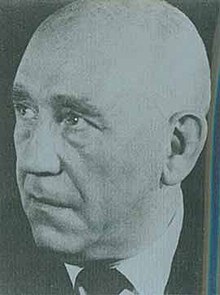Chaim Grade
| Chaim Grade | |
|---|---|

1968 dust jacket photograph
|
|
| Born |
April 4, 1910 Vilnius, Lithuania |
| Died | 26 April 1982 (aged 72) The Bronx, New York |
| Occupation | Writer, Poet |
| Nationality | American |
| Notable works | |
Chaim Grade (April 4, 1910 – April 26, 1982) was one of the leading Yiddish writers of the twentieth century.
Grade was born in in Vilnius, Lithuania (at the time occupied by the Russian Empire) and died in The Bronx, New York. He is buried in Riverside Cemetery, Saddle Brook, NJ)
Grade was raised Orthodox-leaning, and he studied in yeshiva as a teenager, but ended up with a secular outlook, in part from his poetic ambitions. Losing his family in the Holocaust, he resettled in New York, and increasingly took to fiction, writing in Yiddish. Initially he was reluctant to have his work translated.
He was praised by Elie Wiesel as "one of the great—if not the greatest—of living Yiddish novelists."
Chaim Grade, the son of Shlomo Mordecai Grade, a Hebrew teacher and maskil (advocate of the Haskalah, the European Jewish Enlightenment), received a secular as well as Jewish religious education. He studied for several years with Reb Avrohom Yeshaya Karelitz, the Chazon Ish (1878–1953), one of observant Judaism's great Torah scholars. In 1932, Grade began publishing stories and poems in Yiddish, and in the early 1930s was among the founding members of the "Young Vilna" experimental group of artists and writers. He developed a reputation as one of the city's most articulate literary interpreters.
He fled the German invasion of Vilnius in World War II and sought refuge in the Soviet Union. In the Holocaust he lost his wife Frumme-Liebe (daughter of the Rabbi of Glebokie) and his mother Vella Grade Rosenthal (daughter of Rabbi Rafael Blumenthal). When the war ended, he lived briefly in Poland and France before relocating to the United States in 1948.
...
Wikipedia
